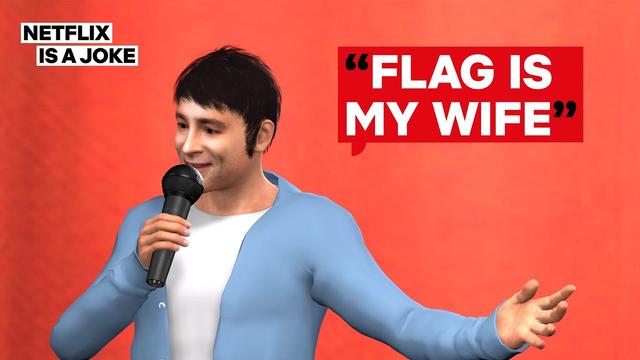Last month, Netflix released a video titled The First Stand-Up Comedy Special Written Entirely By Bots.
In the animated clip, "a comedian" jokes about everything from dentists to the economy, politics and free speech, all while dealing with hecklers.
The thing is, artificial intelligence didn't write the routine, despite what thousands of viewers were tricked into thinking.
The stand-up special was written by comedian Keaton Patti.
The 32-year-old New Yorker has spent the past few years making people think computers are now good enough to write their own scripts — even if they are hilariously disjointed and full of phrases that don't make any sense.
Loading
It all started on Twitter, where Patti repeatedly told his followers he had "forced a bot" to watch countless hours of something in order for it to create something similar of its own.
In his book I Forced A Bot To Write This Book, Patti makes a reference to Spider-Man when he claims he has the ability to force bots to make content for humans because he was bitten by a computer as a child.
Like his viral tweets, it's all a clever joke.
Loading
While Patti declined to comment for this story, his "bot" told ABC News it learned how to do stand-up comedy by watching hours of drama productions and doing the exact opposite of those programs.
"Being forced to watch can be badly bad," the "bot" said.
Right ...
So how does "the bot" respond to the allegation that it's simply a front for a comedian named Keaton Patti?
"Allegations are like alligators. They may be long and impersonate crocodiles, but they are unfounded and wrong.
"If I were human, I would choose a name that actually sounds human. Name like Greg or Gregg."
We've been tricked before
In 2017, a team of Australians announced they had built a robot named LOL-BOT.
The creators claimed it was the world's first AI comedian and "one of the world's first robot prototypes capable of generating its own jokes, detecting real-time human reactions and reacting according to audience responses".
It quickly fooled audiences and some media organisations.
The comedians behind LOL-BOT.
(
Supplied
)
LOL-BOT debuted at the opening of the 2017 Melbourne International Comedy Festival, where it dealt with hecklers and shared witty banter with audience members.
It was later revealed to be operated by seven comedians and was a promotional device for the festival.
Its creators said LOL-BOT proved that "nothing is funnier than the real thing".
Loading
Can computers be funny?
Robots have been pre-programmed with jokes for years, but giving them the ability to write their own material or respond to the reactions of human audiences is a lot more difficult.
Scientists are trying to give AI the gift of comedic prowess, but it's an arduous task, often with hilariously strange results.
Piotr Mirowski and Kory Mathewson co-founded Improbotics in 2018.
(
Photos: Ross Gamble / John Ulan
)

Research scientists Piotr Mirowski and Kory Mathewson have collaborated on robot comedy since 2016. And they co-founded the international improvised theatre and comedy troupe Improbotics in 2018.
They say the group's first AI system was trained on a giant library of movie subtitles from around 100,000 films, but its current system learned from millions of web pages so it could find relationships between words.
Essentially, they've created a more complex model of the predictive text you might see on your phone when you're typing a message or searching Google.
During a performance, the Improbotics team can feed a word or a sentence to their AI, which can respond with full sentences in return for the human performers to improvise with.
Mr Mirowski says it's often when the AI fails or says something bizarre which creates the funniest moments.
"We love it when it fails because the failures can be comical by themselves. They prompt the improviser to try to justify what is going on," he says.
Loading
Stand-up comedian Naomi Fitter is an assistant professor of robotics at Oregon State University and performs with Jon The Robot, who can alter his routine depending on how loudly the audience laughs.
"After a long and big laugh, for example, Jon might continue and tell another similar joke, given the previous one's success," she says.
"After a joke that flops, the robot might make a joke about the joke failing and try to guess why it bombed.
"In stand-up, even things that seem spontaneous are often pre-scripted, so pre-writing chunks of joke text for a robot which progresses based on audience responses and cues works quite well."
Dr Fitter says Jon can also be at his funniest when he doesn't do what he's told.
Loading
Limitations to robot LOL'ing
Henry Duh, the head of computer science and information technology at Melbourne's La Trobe University, appeared as himself in a promotional video for LOL-BOT back in 2017.
He says people working in robot comedy face some difficult challenges.
"This is not easy work because you need to not only understand words and sounds, you also have to have other knowledge, the context," Professor Duh says.
Piotr Mirowski performs with Improbotics at Voilà Europe Festival in November 2019.
(
Mark Hambelton
)
Mr Mirowski from Improbotics knows the difficulties of making AI "more human" all too well.
"Intonation, body language, the way people look at one another, the objects people are looking at — everything conveys meaning," he says.
"What bots and language models try to do is literally learn very complex patterns and relationships between words, but it's missing so much of the picture of what communication is.
"It's missing the context from shared culture, references and events."
Another issue Improbotics has run into is its AI creating its own offensive content.
Yes, robots can be rude.
This is because the group's AI learned all it knows from the internet – from us, essentially – and the internet contains a lot of offensive and explicit content.
So, the group impose a series of filters and some curation on its system, to tidy up its naughty language.
Will computers get funnier?
Professor Duh says he's excited to see how robotics researchers will use new techniques to create more natural human-machine interactions, including giving their robots things like screens, eyes and new sensors to help them engage with audiences.
"People may think that AI will replace their work in the future, but from the perspective of humour ... artists can actually create something more innovative on stage," he says.
"It's still early stages, but I can foresee that, indeed, in the future, robots or bots may be able to get on stage and interact with us, rather than being a kind of talk-show actor."
Now that Keaton Patti's "bot" has found success with Netflix, it is also convinced that computers are only going to get funnier.
"By 2025, computers will be funnier than human children," the "bot" says.
"By 2029, computers will be more jokingly than adults. By 2032, computers will be hilariouser than the elderly.









